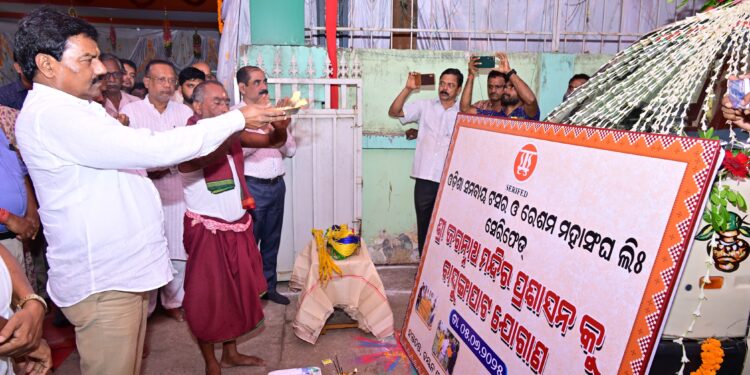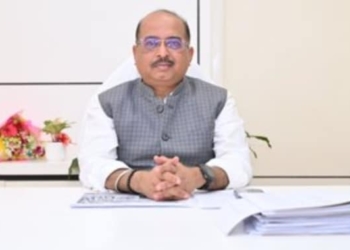In a vibrant display of devotion and tradition, the Odisha Cooperative Tassar and Silk Federation (SERIFED) dispatched 350 kilograms of Basunga Pata, a sacred silk thread, to the Shree Jagannath Temple Administration in Puri today.
This annual ritual, steeped in spiritual significance, ensures the continuation of age-old practices during the world-renowned Rath Yatra and other temple festivals. The ceremonial dispatch, held at SERIFED’s Sahid Nagar office in Bhubaneswar, was flagged off by Pradeep Bal Samant, Minister of Cooperation, Handlooms, Textiles, and Handicrafts, amid a reverent atmosphere of offerings and prayers.
The Basunga Pata, a powerful and pure silk thread, holds a unique place in the rituals of the Jagannath Temple. Crafted exclusively for the deities—Lord Jagannath, Lord Balabhadra, and Devi Subhadra—it is used to create essential ritual items such as Bijaya Dori (victory thread), Paita (sacred thread), and Rakhi (protective band). Unlike commercial silk, Basunga Pata is reserved solely for divine service, with no commercial applications, underscoring its sanctity.
SERIFED has been the trusted supplier of Basunga Pata to the Shree Jagannath Temple since 1981, a responsibility it has upheld with unwavering dedication. This year’s consignment of 350 kilograms continues this legacy, ensuring the temple’s rituals are conducted with the finest materials. The silk is produced from mulberry cocoons cultivated by tribal sericulturists in the Mohana and R. Udayagiri blocks of Gajapati district, showcasing Odisha’s rich tradition of sericulture.
The preparation of Basunga Pata is a meticulous process. The silk cocoons are collected and processed at the Silk Production & Technical Upgradation Centre in Nuapatna, Cuttack district. To achieve its vibrant hue, the silk is dyed using the natural adhesive derived from Kaitha fruit sourced from the Koraput district. This eco-friendly and traditional dyeing process enhances the thread’s purity, aligning with its sacred purpose. The final product is crafted into threads or ropes as per the temple’s specifications, ready to serve in the divine rituals of the Chaturdha Murti (the four deities).
The dispatch event was marked by deep reverence. Before the consignment was sent to Puri, Minister Pradeep Bal Samant, alongside senior officials, offered incense, lamps, and flowers in a heartfelt puja, praying for the blessings of Lord Jagannath. The ceremony was attended by prominent figures, including Shri Premchandra Choudhary, Director of Handlooms & Textiles; Smt. Pranati Chhotray, Director of Handicrafts; Smt. Madhumita Rath, Joint Secretary (IAS); Shri Bhagirathi Nand, Chairman of SERIFED; and Shri Bikramaditya Barik, Managing Director of SERIFED. Their presence highlighted the significance of this tradition, which bridges Odisha’s cultural heritage with its spiritual ethos.
The production of Basunga Pata also reflects Odisha’s commitment to empowering its tribal communities. The mulberry silk cocoons are sourced from tribal sericulturists in Gajapati, providing them with a sustainable livelihood. By integrating traditional practices with modern processing techniques, SERIFED not only preserves Odisha’s cultural legacy but also supports the economic upliftment of marginalised communities. The use of Kaitha fruit adhesive further emphasises the eco-conscious approach, blending tradition with sustainability.
The Basunga Pata is more than just a thread; it is a symbol of Odisha’s deep-rooted faith and craftsmanship. Its exclusive use in the Jagannath Temple’s rituals, particularly during the grand Rath Yatra, underscores its spiritual importance. As the chariots of the deities roll through the streets of Puri, the Basunga Pata plays a vital role in ensuring the rituals are conducted with sanctity and precision.
This year’s dispatch reaffirms SERIFED’s pivotal role in upholding Odisha’s spiritual and cultural traditions. As the sacred silk makes its way to Puri, it carries with it the devotion of countless artisans, weavers, and officials who contribute to this divine offering.






























